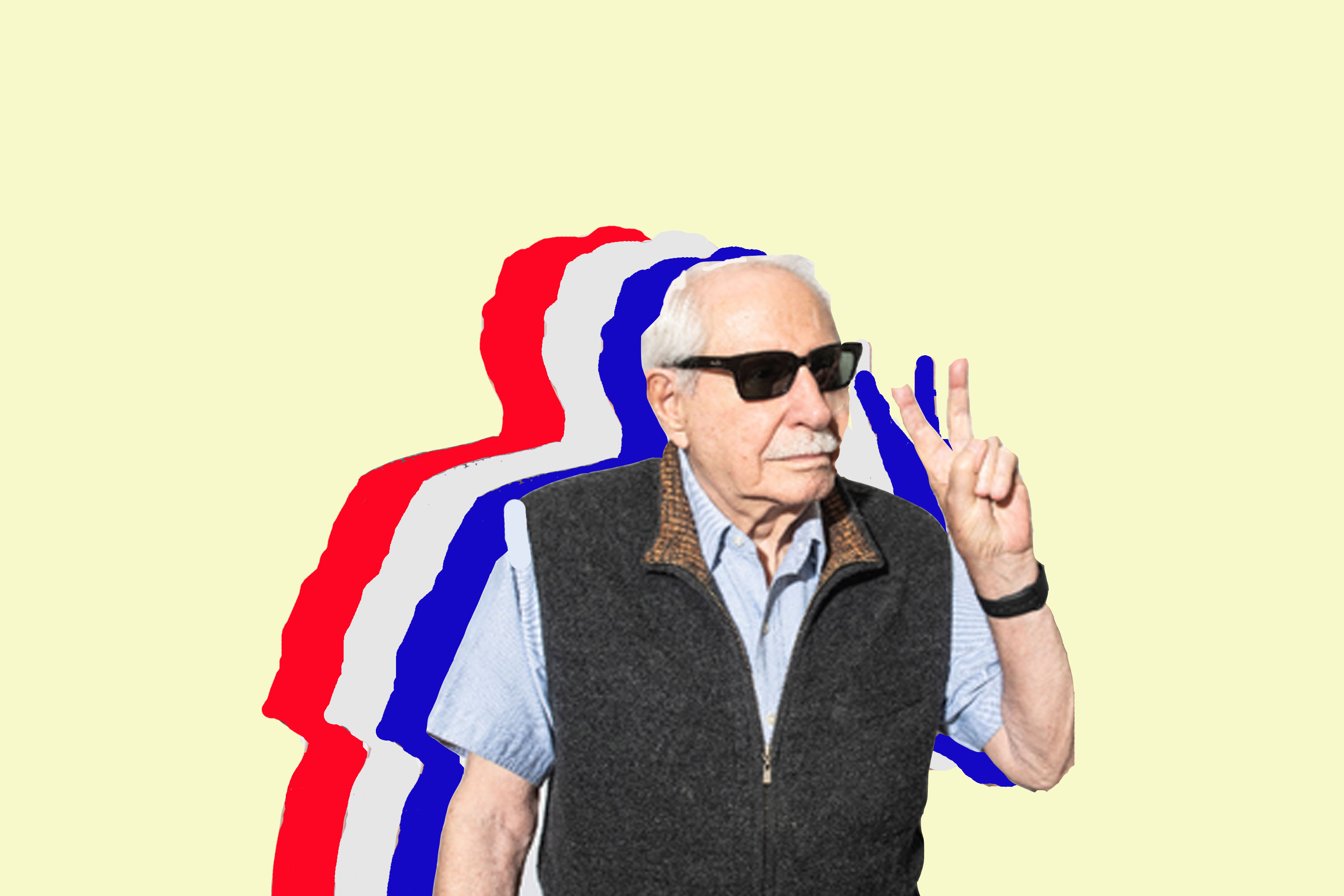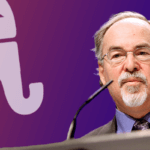
“That was one of the things the campaign was good at: trying to get as much controversy as possible by provoking conflicts. It’s not an honorable way to go through campaigning, but it worked. Better than you could say for Tim Ryan.”
In March, 2019, two students, David Oks and Henry Williams, decided to launch a presidential campaign aimed at re-examining American foreign policy, as well as promoting left-wing progressivism domestically. They chose as their vehicle former Alaska Senator Mike Gravel (D). Sen. Gravel, who gained considerable attention for reading the Pentagon Papers into the Congressional Record in 1971 (as well as for his spirited 2008 presidential campaign), agreed to the teens’ request to run in 2020. Although the initial focus of the campaign was to gain enough support to bring Gravel to the debate stage, the teens later announced that Gravel was ‘in it to win it.’ The Gravel campaign found itself gaining traction on social media, especially Twitter, and, on July 12th, the campaign reported that it received its 65,000th donation. Although Gravel suspended his campaign on August 6th, Oks and Williams believe that the campaign will continue to have future influence on circles on the Left. They join Merion West and John George to discuss the origins of their unlikely campaign and the influence they believe it has had on the current Democratic field.
Why did you decide to embark on this campaign, and how did you come to choose Gravel as the vehicle for your project?
Henry Williams: The reason we did this is we thought that American politics keeps going to the Left. In order for that to happen, there always has to be a left-flank in the mainstream discourse. This primary had a spot wide open to the left of Bernie Sanders, which we thought was important. But the most important thing to us was a global, historical view of leftism—and how it’s situated—that requires being anti-imperialist. Mike Gravel is obviously one of the most substantively anti-imperialist U.S. policymakers of the last 50 years. I mean, there’s almost no one like him. He took the single boldest stance against American hegemony from within the government other than Daniel Ellsberg, and he was friends with Daniel Ellsberg. [Gravel] helped release the Pentagon Papers. He was someone with this incredible history, and he was also somebody who admittedly was a bit of a kook.
He ran a crazy campaign in 2008, which was also, at the time, run by young people, 20 somethings. He seemed like he was the type of person who was up for an idea that seemed crazy but might work. That was why I believed it was possible. David picked it out and pitched it to me. I thought it was a crazy idea, but I think as time went on it started to [morph] into something. And we thought [that] the Left wants to see its ideas talked about so badly that it will get behind a 90-year-old. Lo and behold, it worked. I don’t think that we were prescient; I think we were wrong about plenty, but I think we had one correct prediction, which was that there was an audience. What we were wrong about was how large it was.
I didn’t think it was large enough for us to get 65,000 donors. When we were talking about it early in the campaign, I predicted 10,000 would be our maximum. And we ended up with 67,000 donors. $350,000 raised. And we have merchandise orders still in fulfillment…They’re getting mailed out now. It’s going to take another month, but people love getting merchandise. But look, we’re amateurs. It was a very amateur campaign.
When did it first start to gain traction?
David Oks: Immediately.
Henry Williams: The first day we went public. We got Mike’s Twitter account, and we gained 15,000 followers in the first day. We then went up to around 20,000, 30,000, and from there, it was just this long, upward trajectory.
David Oks: There was the launch on April 8th.
Henry Williams: There was 4/20. There were a couple of really major exchanges we had on Twitter, a couple of tweets that went really big.
David Oks: Live tweeting the debates.
Henry Williams: Live tweeting the debates was a major turning point. And Miami, being in Miami was a major turning point.
David Oks: Andrew Yang, Marianne Williamson, who ended up helping us in the home stretch by giving us a shoutout.
David Oks: There was bullying John Delaney.
Henry Williams: Bullying John Delaney: getting #DropOutDelaney trending on Twitter. Yeah, it was a lot of things. There was no single moment, other than the first day. There wasn’t a single moment where it got big. Another big thing was in terms of discourse setting.
David Oks: Oh f—: Getting endorsed by the guy that threw his shoes at George Bush. That was a good day. We figured that all we really needed was for maybe three or so percent of the people who know who you were to donate to you. If you want to appeal to as large an audience as is conceivable, maybe you try to get ten percent [to donate] by being moderate and as broadly acceptable as possible. But we knew that we couldn’t do that with Gravel, so we just had to get as wide an audience as possible.
And the way to do that was the conscious cultivation of controversy. To some extent, all press is good press. Maybe 95 percent of people who read a news article about, “Guy who threw shoes at George Bush endorses Mike Gravel,” say, “That’s f—ing disgusting.” But all you need is the 5% who say, “That owns,” you know? That was one of the things the campaign was good at: trying to get as much controversy as possible by provoking conflicts. It’s not an honorable way to go through campaigning, but it worked. Better than you could say for Tim Ryan.
Henry Williams: I mean—the institution of American electoral politics (and the presidential primary) is inherently immoral and, in general, unethical. The tactics and strategy used by most campaigns is pretty vapid and stupid, so we figured, look, it’s about manipulating the media and getting the coverage that you need, as well as finding your own niche and your own audience, being aggressive, picking fights, whatever. If we’re going to do it, we should do it better than any of them. And I think our dollar per donor was the best of any candidate in the field by a lot. We had the largest percentage of small donors of any candidate running in this election cycle by a lot. Bernie was like 70 percent, ours was 96 percent small donors. It was a very different kind of campaign. I think we definitely proved a couple of things were possible. Another thing was a New York Times story written by Jamie Lauren Keiles, which definitely changed things. It wasn’t super viral compared to other things, but it was read by a lot of people who are really influential on the Left. Activists, political organizers, and I think that’s what got them interested in the campaign, and that’s what let us break out into a new audience. Once we got a couple of fans among serious influencers on the Left, we could get really big.
What would you say was the most surprising part of your campaign?
Henry Williams: The fact that it even got off the ground at all was really surprising to me: that there was an audience like there was. Chapo Trap House rejecting us—that wasn’t surprising, but it was disheartening. One of the most surprising things was Pete Buttigieg’s communications director.
David Oks: Oh yeah, she was a big fan.
Henry Williams: She was a big fan. Even though all we did was trash Mayor Pete, and Dave and I have a deep hatred in our heart for that campaign and that man, but Liz Smith, his communications director, was like: “Hey, I know you guys don’t like us, but I respect the campaign and the work you’re doing.”
David Oks: She gave us her personal email, like keep me updated.
Tell me about Pete Buttigieg.
David Oks: Oh, the tweet that I put out—this is one of my favorite tweets that I put out the whole campaign: “Pete Buttigieg is what you get when Patrick Bateman does politics instead of banking.” Because I thought that Pete was the epitome of an amoral careerist who doesn’t actually care about anything and doesn’t care about people. [He] simply wants to get ahead. And you can see it in his eyes.
I think the same is true of Kamala. I think Joe Biden and Beto are a little bit too pathetic for it. I have a lot of respect for the candidates you can sense are actual people. I think that’s true of Bernie, Warren, Yang, Marianne—and Biden, to some extent, [but] his mind is failing. Beto—it’s kind of sad; you kind of have to feel bad for him. He came out on a skateboard recently, on his campaign. It’s really not great.
Henry Williams: One thing that killed us about Mayor Pete too, and one of the key things that keyed us into the fact that [the Gravel campaign] was a possibility was that [2020 was] a big primary with a lot of different kinds of candidates in it, more so than the 2016 primary. Some of these candidates got in with no formal backing. Andrew Yang, for example. So we thought he modeled the way a campaign could get big online, especially an ideas-based campaign that had one major idea. Ours was anti-imperialism. So it could stake out a niche, get a super devoted online following, and use that to keep building from there.
But the other side of that was Mayor Pete, and he was just starting to get big in the media about when the campaign started. And one thing that we always found infuriating about him was the way it was such a media creation. He was the mayor of a town smaller than Yonkers, and, as it turns out, not even a particularly good mayor of that town. S—–y vanity projects about making the downtown look spiffy, and the whole thing is this resume stunt. Anyone with that kind of vision, you know, “What’s my fastest path to the White House,” is a psychopath and believes in nothing but power. He’s not trying to make a difference for any particular group of people; he’s trying to establish the most powerful resume he can and make connections. I mean, the fact that he’s raising as much as he is: $20 million a quarter, for a campaign from a mayor of America’s 300th, or 400th largest town? I mean, it’s f—ing awful. It’s disgusting. The fact that he’s even in the race, the fact that he’s someone to even consider is 100 percent a fabrication of the elite media, who cannot stop fawning over candidates with credentials, candidates who can speak a sentence in a bunch of different languages.
David Oks: Undercover, he’s actually not very good in any of these languages.
Henry Williams: Even though he supposedly speaks them. And his communications manager is a very gifted politico and played a very interesting strategy. Look, his campaign was fabricated from cloth; he went from half a percent to 10 percent to 15 percent, now he’s consistently in fourth place. He is a serious contender in this election basically only because of how he’s treated by the media. I think that is a disgusting, disgusting testament, not just to the influence of our mass media but also how gullible we are for these savior figures. We want to find someone who, in their person, represents what we want from politics. We don’t believe in movements. We don’t think movements and people can fix problems; we just want the next Obama to swoop in and save us from Trump. And I think that’s what Pete represents, and that’s why I’m so disgusted with him.
The other reason we dislike Pete is right after Pete went big, our campaign was starting, all these other people, like Bill de Blasio, is like: ‘I’m the major of the largest city in America, I should run.’ Because they saw that Pete was able to do it; they saw that he went from a nobody to a serious candidate, just by playing the media. So they all thought they could do it, but they were all wrong. But they all f—ing took up space on the debate stage, so even though Mike qualified, he couldn’t…
David Oks: If Bill de Blasio had listened to the plea, the pleas of his wife…
Henry Williams: Literally. Literally, his wife was begging him not to run. And he ran for two months? Three months?
Pathetic. Pathetic effort. A massive waste of time and money.
David Oks: I hope it damaged his f—ing favorables. God.
Henry Williams: If he didn’t run, Mike Gravel would have been on that stage. If any one of these candidates hadn’t run, Mike would have been on that stage. That’s kind of what kills me. The movement had a lot of energy behind it. It got so close to succeeding, closer than we ever could have imagined. And I think we’re kind of living in the wake of that now. That’s why we’re interested in things that are a little more long term because we don’t want—I’m worried about the young people hitching everything that they believe in to Bernie. Because if these movements fail or lose, people get depressed; they get dejected, and they stop caring about politics. Occupy motivated a lot of people to care about finance, care about money in America deeply for three months, and then they all stopped. That’s the fundamental question. Can you build these things that will last outside the campaign and outside this atmosphere? I don’t know if the answer is yes. I know things like Jacobin are able to persist and grow, but they’re also very tied to the fate of the left American politics. I think if Joe Biden were to be the nominee, if the American left were to be eviscerated, God forbid if AOC gets primaried…
David Oks: No, she’s not going to get primaried. I hope not. That would never happen.
Henry Williams: If establishment Democrats try to pick off AOC, or Ilhan, or any of these people, they maybe could. If Bernie loses, or God forbid dies, and Warren is also kneecapped, and we get four years of President Biden, I think the American left—I do take the long view, but I also think that Jacobin would be a lot less relevant in that world than it is right now.
David Oks: God, that would be dark, that would be incredibly dark. I hope we do not live in that timeline. In that timeline, that would be when I retreat to Guyana.
Henry Williams: The Left justly has high hopes right now, and those high hopes are for a democratic socialist in the White House. It would be a profound moment in American history
Henry and David, thanks for your time today.










